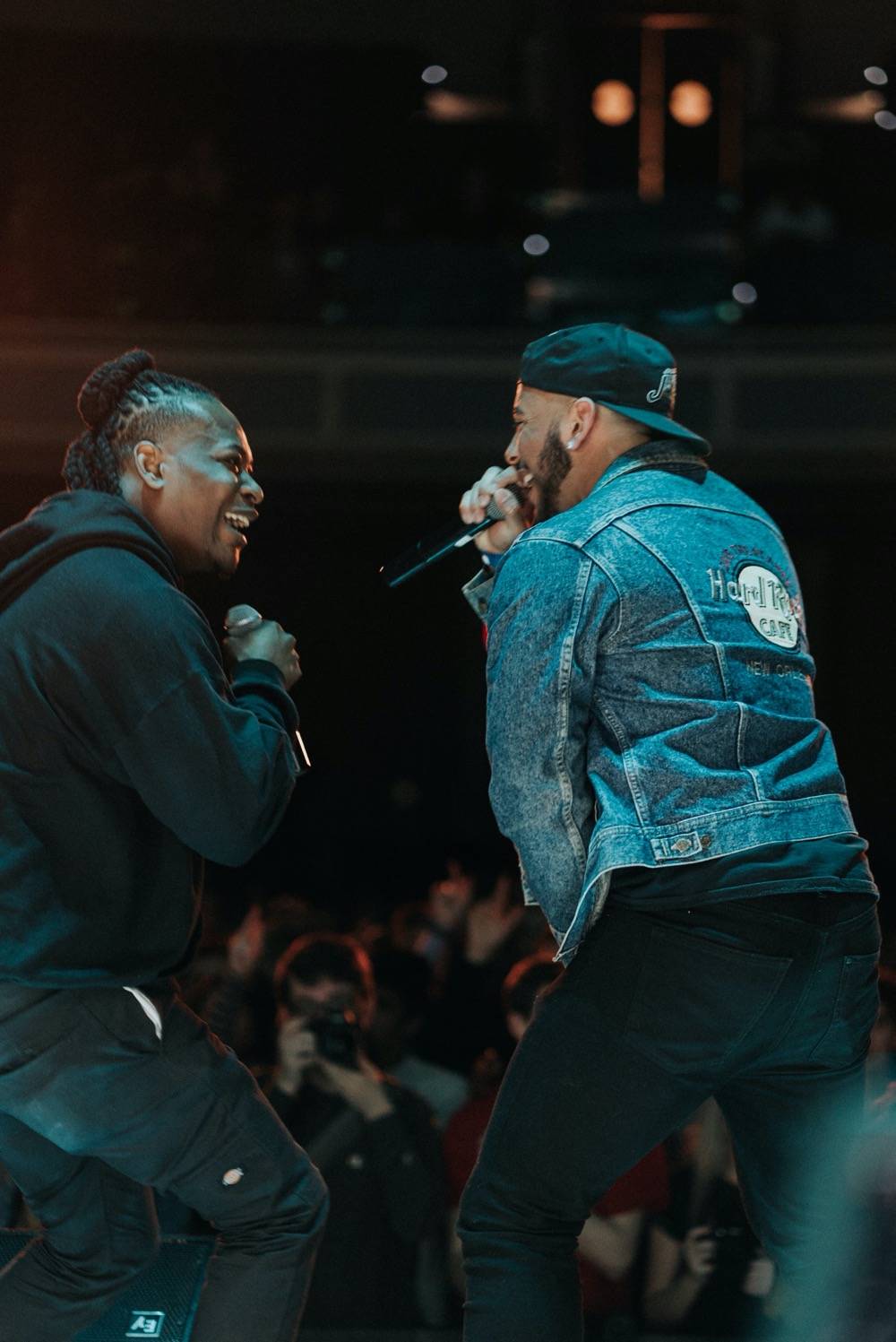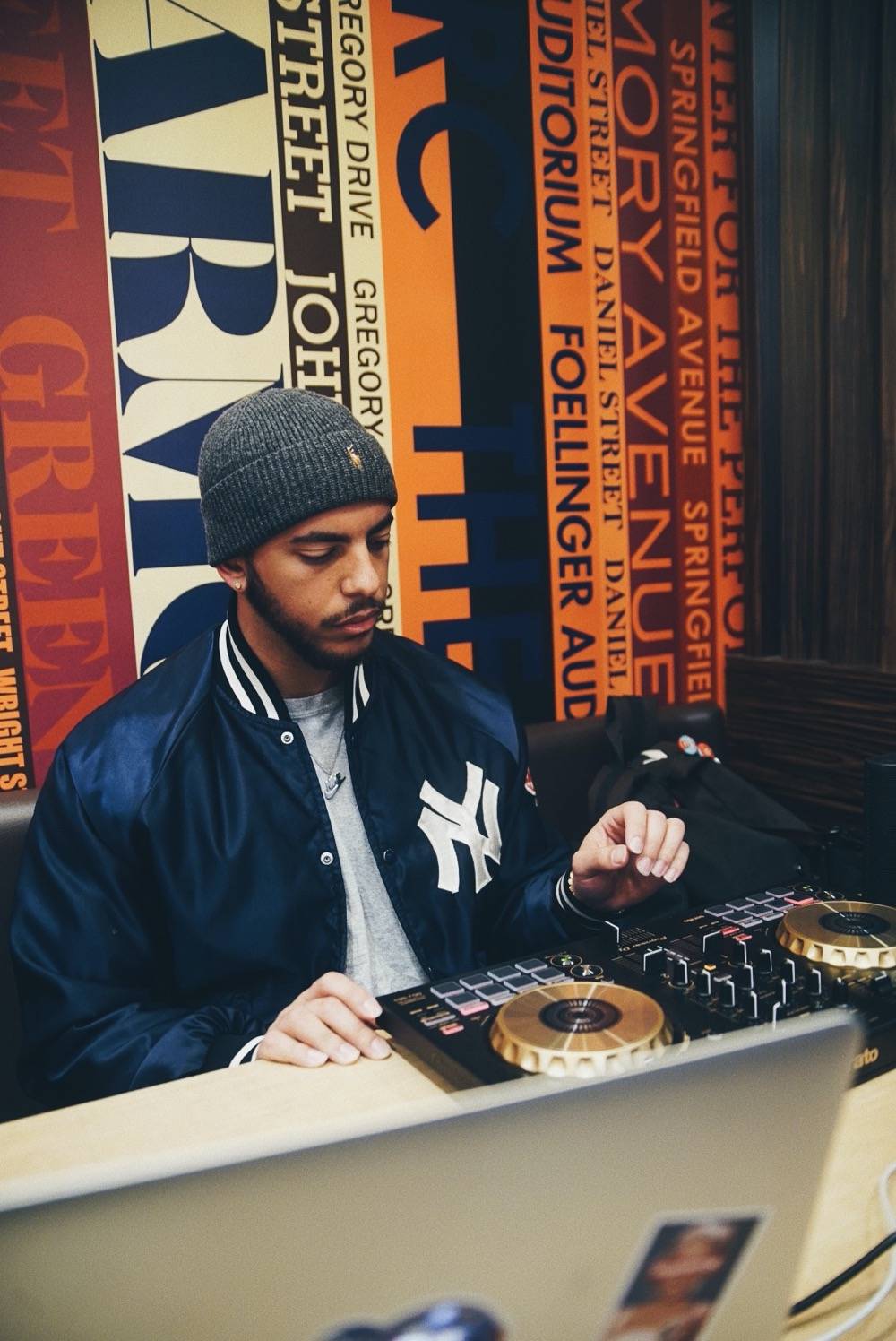WilliamGold is truly an innovator in his artistry. The producer and MC is full of bold ideas, and he’s not afraid to go out and execute. If you’re an Illinois student or an alum, perhaps you know him as the McDonald’s DJ.
WilliamGold, whose actual name is Jordan Patterson, has provided the late-night backdrop for countless patrons of Green Street’s 24/7 fast food hub over the last few years, but that’s just one display of his creativity. He also helped design the set for Champaign rapper Gatson back in March, where the two opened up for Atlanta hip-hop duo Earthgang.
“The biggest thing for me is that when to do things in music, you have to do them in a way that’s going to spark interest,” Patterson said. “You have to be different and unique, and you have to do something that people haven’t seen before. And I think that I’m still trying to figure out what that formula is and what that looks like. But I feel myself getting close to it.”

Patterson (right) performing with Gatson (left) in support of Earthgang. Photo by Boots Howard.
Patterson’s willingness to differentiate himself from the norms of the music industry is part of what makes him intriguing as an artist, but it’s also reflective of his personality.
In June, he put out Asleep With the TV On, an album that showcases his love for experimentation. The 12-track project runs just over 28 minutes, as Patterson provides listeners with an honest, open introduction to himself. He weaves late-night tales about his life, laying down his bars over seductive horns throughout the album, while mixing in a couple of skits. His lyrics are funny and open, and even a bit self-deprecating, while offering introspective reflection about his direction and progression as an artist and as a human.
On “Chicago…”, he reflects on his time in the city and a specific occasion where he attempted to network with the likes of Chance the Rapper, Taylor Bennett and several other prominent artists after attending a show.
“Let me make contact,” he raps, “wrote about 100 tweets, never got a response back. That’s besides the fact, I miss Chicago.”
Rather than getting caught up in self-doubt or dwelling on missed opportunities, he sets his gaze onward.
“I don’t even care to worry about people who stare, to worry about jumping to the top when I should be taking the stairs,” he raps later on the same track.
Patterson has also come around to the idea of never being able to attain perfection in his work. Success is based in perseverance, repetition and experience, not about one perfect record. He doesn’t have interest in sounding like everyone else or adhering to industry standards.
“My music is kind of like that, where I disregard the need for perfection, for perfected media,” he said. “It’s like me saying this is my own interpretation of what’s happening in the mainstream and what people are putting out, but this is WilliamGold’s version of it. This is how I use imperfections in my music to really tell the story and to show the humanistic approach to making music again. We’re all so used to hearing radio edits and everything being so perfect, everything to the chord and to the note. I’m like, ‘well, let’s embrace like people do when they improvise, let’s embrace imperfections.’”
Despite his mindset, the album was more than two years in the making. After attending Ball State University, Patterson began working on the project with his brother, who is also a producer (he goes by Arktic). He was particularly pleased when he came up with “Floor 38…”, the album’s final track, and he and Arktic have a natural chemistry that allows them to work well together.
Another theme of the album — and the reason why it got its name — is about literally falling asleep while the TV is playing, and how that can have an affect on people’s dreams. Dreams aren’t an exact science, and they don’t usually present a clear picture of reality, but rather distortions of it.
“When you’re watching TV or whatever, you’re sitting on the couch or in bed and you’re watching commercials, and TV shows come at you, which are all quality assured,” he said. “They’ve been past the eyes of 20, 30 or 40 people to make sure it’s OK to go out for millions to see. And the idea of falling asleep when that is on is saying, sometimes when you sleep, what your dream is of what you were watching on TV. You’ll have little iterations of whatever you’re watching on TV, but they’re in these really convoluted ways, like your brain does this interesting thing where it takes whatever you’ve seen and makes its own iteration of it.”

Photo by Boots Howard.
Asleep With the TV On is technically Patterson’s fourth project as WilliamGold, but he calls it his first “album album.”
Gold had a detailed plan for the rollout, but the album’s release date in the first week of June came right as widespread unrest and protests were unfolding across the United States in the wake of the police murder of George Floyd in Minneapolis.
Like millions of Americans and people around the world, Patterson was stricken with grief. He wanted to give people a break from all the tension and emotions, but didn’t want to take away from important messages on social media and in the community. Ultimately, he and his team decided to roll out the album while continuing to speak out in support of the Black Lives Matter movement and against structural racism and police brutality.
“For me and the team, it was hard,” he said. “My music has always been centered in some way, shape, or form around social justice types and things I care about. I always hold that at the center of my approach to music because it’s the way that I protest.”
“I don’t march much and I don’t go to other protests or things like that, boots on the ground,” he continued. “I really protest through my music and my art, and I tell stories and I make an impact. I make an impact by talking about how I feel in a way that some people may feel uncomfortable with, but it speaks volumes.”
Friends and followers met the project with positive feedback, Patterson said. Now, he is continuing to forge ahead with bold plans for himself and other artists he collaborates with.
He and his brother are in the process of building a home studio, which they hope will become a natural haven for artists and producers. Patterson believes that there is a powerful correlation between artists and producers having tight, cohesive relationships and a stronger musical product emerging.
“The more you can relate to people and build relationships, the more people buy into what you do,” he said.
Obviously, the COVID-19 pandemic presents a logistical challenge for the studio to get up and running, but Gold is prepared to meet that in his typical adaptive, outside-the-box approach.
“We’re focusing on building this collective of producers that are really tailored to artists and relationships,” he said. “It’d be less about the money and more about the connections. Working on that in this time, there’s no telling where COVID is going to take us and how I’m going to be able to interact with people. But it’s a challenge and not a speed bump. I’m just excited to improvise and innovate.”








